- Home
- Peter Orullian
At the Manger Page 18
At the Manger Read online
Page 18
The room grew sultry with sweat and heat. Hot food came to give energy to a second round of questions. Fingers greedily snatched pieces of flatbread and meat, and slices of sweet vegetables and fruits, creating a slight lull before the next question came.
“Tell us, Emperor, how does one attain the title of Senator in your illustrious court?”
Thomas stood again, waving the roasted leg of a bird and chuffed something unintelligible. Having remained silent long enough, I took the opportunity to jump to my own seat. “A senator gains his seat through a mandate of the masses,” I announced. “He represents a segment of the population, expressing their interests to the governing body, and working solutions that meet the needs of the people and the glory of Rome. Which,” I pointed to my backside, “can be measured by the padding of one’s seat.”
Heads turned, mouths fell open. I knew I’d either offended everyone, or spoken far outside their understanding. The answer had come unbidden to my mouth; the product of many tutors paid for by my papa’s vineyard. That and a little insolence.
Just when I was preparing to duck what I was sure would be a barrage of food and plates, cheers rang out: “A new contender for Emperor!”
“Someone with real answers!”
“All this, and he makes wine, too.”
Instantly, I had a room full of friends. Even Thomas bowed, deferring to me. For an hour I stood on my chair, fielding questions one by one. I mixed fact with fancy, delighting my crowd and my patrons. I won the hearts of good men and women, whose sweat stains showed honesty more boldly than I’d ever seen.
Once in a while, my orations were interrupted by the enchanting sound of a woman’s palm lashing across a patron’s face for becoming too bold with his hands. Mostly, I liked how everyone in these places laughed together, even when they didn’t understand the joke.
“How shall a mother determine the merits of a suitor for her daughter’s hand?” one woman sang out above the crowd.
“Fine woman,” I lavished, “It is a simple matter. A woman deserves a man who works, but retains his grace. So every mother should stand the hopeful bridegroom beside the hindquarters of an ass. Whichever makes a peep first is not . . . patient enough to deserve the lady’s hand.”
Raucous laughter ensued.
“And what of war, Emperor?” asked another. “How can Israel be sure your interests are to protect us from our enemies? What advantage lies in the occupation of a handful of desert tribes?”
The crowd attended me more quietly. I passed my eyes over them with deliberation. “I presume you hold yourselves steadfast in the ways of your prophet Moses, and look forward to one who will again lead you from the captivity you believe Rome forces upon you. And perhaps you’re right. Rome’s interest is its own expansion; to spread the ideal of its principles as widely as possible. Is this not the same hope you harbor in your messiah?” I paused after such an obviously rhetorical question. “Rome will protect you because it claims you,” I continued. “Your empty pockets prove their hold upon you.” General disgruntlement stirred among them, so quickly I added, “But I claim you and will protect you because you buy my wine with money earned by hard work.”
Admiration ascended in a robust chorus of cheers.
When the shouts had died down again, a woman called, “Then tell us! What will you do to ease the burden on our backs and fill the purses at our hips?”
“Why, I’ll do what all good Emperors do,” I retorted. “I’ll tell you it doesn’t hurt, raise your taxes, and ask you how you like the improvements.”
On it went into the evening. Gradually, the participants became more sedate, and I passed the torch back to Thomas, who received questions affably, but spoke in milder tones. Most of the guests had retired to their rooms, a few leaving for home. While I sat quietly, appeased, listening to Thomas deliver his inaugural speech to his only two remaining constituents, a soft rapping came at the door.
I watched Michael bustle past Thomas and his friends to the front door. Murmured conversation ensued. I tried to ignore Thomas and his effulgent speech about free wine for every one of his subjects now that he was in power. Finally, the door closed and Michael stepped back into the room, looking frustrated. I supposed that he was upset with Thomas for continuing his pageantry while so many were already trying to sleep. I took leave of my august company and went to Michael to discover the matter.
“Who was at the door?” I asked.
“Ah, Grape, it was just some man and his wife wanting a room,” he replied. “At this hour, can you believe it? The gentleman’s wife was with child, but I have no rooms left.”
The thought of turning away a pregnant woman into the night seemed to weigh heavily upon him. Michael looked over my shoulder at Thomas, who was trying to cajole his friends to hoist him onto their shoulders so he could look down upon his kingdom. His followers relented and attempted to lift him. I turned in time to see Thomas, halfway to his place upon their shoulders, go tumbling to the ground. All three men laughed from their seats upon the floor.
“Quiet in there!” Michael shouted. “I’ll throw you out if you don’t make an end of it.”
A thought suddenly occurred to me, something from my childhood. I caught Michael’s attention with a touch at his elbow. “The stable.”
He looked back at me, irritated. “What?”
“Put them in the stable, Michael. It’s dry and warm. You and I both know they won’t get a room anywhere tonight.”
He paused, then his features softened, as if the suggestion had eased his guilt at having turned the travelers away. “Another inspired answer from the Emperor of the Grape,” he muttered. Hurriedly, he opened the door and rushed out into the night. Moments later, he returned, a thin smile on his lips. “Thank you, thank you,” he enthused.
I shook my head. “Not at all.” Something more occurred to me, and as Michael prepared to pass, I took hold of his arm. “It is a fine stable, Michael. Do you owe any of its comforts to an unpaid carpenter?”
Surprise mushroomed on his face. “I had forgotten! Your reminders are a blessing!”
Again I shook my head. “Glad to be of service.”
Michael clapped me on the shoulder. “Thank you. I’ll gather the carpenter soon, but first...”
He brushed passed me and went directly to Thomas, hoisted the man on his scrawny back, and began to caper and prance about. “Hail Caesar!” he shouted, so cheerful that he forgot his own admonition to be quiet. The four of them laughed and danced and vied for preeminence as each took turn at being Emperor.
I went to the door and watched the man and his pregnant wife make their way to the stable. It wasn’t until years later that I learned who they were, when a man by the name of Paul came to my vineyard and taught of the child the woman bore that night. Had I known, I would have given them my room. As it is, I think the child had the better of it. My most blessed moments were lying upon a bed of hay and imagining the future as a boy in my father’s vineyard. I like to think the child felt the same.
The Manger - Part II
WALKING MY CART into the gathering dusk beyond the gates of Bethlehem, I carried Ruth’s hopeful smile in my mind like a beacon. More than my wife, she had become my only reason to carry on in the face of such hardships as had beset us.
The embarrassment of asking to do free work for Michael, the innkeeper; the scorn of my fellow tradesmen for doing so; and Ruth, herself, deeming my first attempt at building the manger to be inadequate, these things faded when I considered the trust she placed in me, and the life of our unborn child.
Mild evening breezes swept the land, freshened with the scent of cedars. Around me, the world stretched to meet the sky; ahead, the road led to my last chance to procure the wood I needed to complete the job. I breathed deeply, my pace quickening as I recalled a wood castle I tried to sell at market, shelves I removed from an elderly woman’s shop that I’d had to use to build a coffin for another man’s mother, and the harsh tongue of a money lende
r who would spare me no loan.
With Ruth grown so weak from lack of food, my fears pressed in around me, and I moved even faster through the night, thinking of promises.
Having given the last of our money to a beggar on the Row, there was nothing left to do but go to my friend David the olive farmer and seek his charity. I arrived to the whir of crickets and the sweet perfume of ripe olives. My old friend was gracious, and willingly lent me what I needed.
I hastened home, and that same evening I worked well into the night. Ruth brought me more to eat, then finally went to bed, exhausted. For my part, I had never felt so awake, so alive, so determined. I planned my work, envisioned the contours. I chuckled at my own earnestness as I considered that I was only fashioning a feedbox for a low-class inn. But it didn’t seem to matter. Every stroke of my blade and chisel, each refining notch, every last measurement was as exact as I could make it. I would either be the greatest fool to produce work for free, or the most noted carpenter for animal furniture ever known. Neither mattered. All I cared about was the opinion of the woman that snored mildly from our bed. Into the night I continued my work, smiling at the one indelicate sound my noble, beautiful wife ever produced. Glad of it, I went on. If she slept as sound and calm as an angel, I might have suspected I was in the wrong house.
I finished at dawn.
Quietly, I woke my snoring beauty. With my hands over her eyes, I guided her to my workbenches. Morning freshened the world, glorious hues lighting the east. I removed my hands to let her see the manger.
“Open your eyes,” I told her.
Ruth looked. No sooner had she seen the feedbox than she threw her arms around me and hugged me so hard I thought I might collapse from lack of breath. Then, she kissed me, talking as she put her lips on mine. “I love you, Luke! You make me so proud to be your wife. And you are going to get that job.” Her unerring hope became my triumph that morning as we embraced over a stable trough.
Still holding on to me, she jumped up and down with excitement, and we lost our balance and fell, just missing the manger. Over the cool earth we rolled, laughing ’til we cried. It seemed so silly, yet entirely appropriate. Somehow the journey had ended, and what happened thereafter didn’t matter. Though we hoped this small olivewood box would convince the innkeeper and answer our prayers, I found myself praying as Ruth and I rolled that I would never forget the lesson she had taught me.
I delivered the box that day. The innkeeper was out, but I left the manger in his stable and decided to return later. Days passed, and I still hadn’t caught up with Michael to have his decision on giving me the rest of the work. I visited the stable alone twice, staring in at my manger, but unable to gather enough courage to do more than look, grumble at those unfortunate enough to be using the stable, and make my way home empty-handed.
My stomach grew louder each day with hunger, but I tried to ignore it when I heard Ruth’s own stomach cry for food. All the while, she talked and sang a happier song than she had for months. Those next few days were enough to wear out my patience, and cause me to doubt the propriety of the good feelings I’d had in crafting the manger. I only hoped Ruth’s faith was not misplaced.
That night the innkeeper came to our door. “I want you to come with me,” he said.
Before I could ask if he had decided about the rest of the contract, he left our door and headed back toward his inn. I called for Ruth and we quickly followed.
As we came to the inn, we went to the stable where a small crowd of people had gathered. I feared that I had done something wrong and that somehow my manger had implicated me in something. I took Ruth’s hand tightly in my own and we crept slowly through the assembly toward the inner stable.
Coming through those gathered around, I saw the most amazing thing I had ever seen in my life. Beneath two oil-lamps lay my manger, a child upon a bed of straw within. His parents knelt behind him, and all those standing nearby looked on in wonder and worship.
“What is this?” I asked in a hushed voice.
“Luke, I am not sure,” Michael whispered reverently. “Some are calling this babe a king. Others have just gathered and watched. But whatever the truth, after I told them they could stay in my stable, I returned to find that the woman had given birth and placed the babe there.” He pointed at my manger.
Quietly, we stared in wonder. Ruth squeezed my hand, and I turned to her.
“It is the messiah,” she said, her voice certain and melodic. She nodded once, her eyes glassy, catching the light of the oil lamps. “I just know it is! Can’t you feel it?” She looked at me expectantly and smiled.
I waited, not knowing how to respond. My mind returned to several images in mild succession . . . I remembered laboring through the night on the box, making sure lines and tight seams. I remembered the kindness of my friend David lending me the wood from his olive groves in a tight season of commerce. I remembered pottery shelves that formed a coffin, and a delicate wooden castle that would become an artist’s tool. I remembered drinking water beneath a cypress tree and the gentle reproof of a midwife. Mostly I remembered the way Ruth had spoken to me after seeing my first attempt, offering her honest consideration, and inspiring me to do more, to do my best work. Slowly, a peace came over me. Of course, Ruth was right again. My heart leapt with gratitude that she had helped me see what I should do. For what might I have felt if I had come to this stable and seen this child lying in my first attempt? I shut my eyes against the thought.
When I opened them, David the olive farmer had eased way into the small crowd, and stood just ahead of me. We watched as, one by one, people approached the manger to lay gifts near the foot of the child’s bed. I saw my friend look at empty hands, then cast a searching look back over those gathered around. Again he looked back at the manger, this time his eyes glistening as though he held back tears, whether of joy or sadness I could not tell.
The news of his orchard fire had reached to all of Bethlehem. I patted Ruth’s hand, then moved to David’s side. “I am sorry about your orchard, my friend.”
“It will be all right,” he said bravely. “My heart is full.” But I saw him clench empty hands, as if wishing he had something to present at the manger.
My friend sighed and pulled his wife close. With a secretive smile I inclined nearer to him and whispered, “The wood I borrowed was to build the manger in which the child lies.”
David’s head jerked toward me, surprise large in his eyes. He mouthed several silent, indecipherable words. Then a splendid grin spread over his whole face. As he turned to whisper the news to his wife, I stepped back beside Ruth and took her hand. Shortly, David’s daughter, Elizabeth, arrived carrying a small branch. Together, they placed it at the foot of the manger, hugged, and stepped back.
As we watched in silence, a crippled man crawled toward the child. After a brief pause, he tucked his legs under him and looked directly down on the babe. I saw him speak with a man kneeling near the feedbox I’d built. A moment later, the man settled back on a bed of hay and the cripple wrapped powerful arms around the sides of the manger. I knew instantly who he was.
Other faces were familiar to me. Standing in their company, and all of us attendant to the beautiful child, I felt a quiet within, a sureness, I had never known.
A familiar voice interrupted the moment with a reverent whisper: “When would you like to start on the inn?”
Looking in at my new assistant whose arms held the child’s bed fast, I pulled Ruth close, and together we thanked the babe lying in my manger.
About the Author
PETER ORULLIAN has worked at Xbox for over a decade, which is good, because he’s a gamer. He’s toured internationally with various bands and been a featured vocalist at major rock and metal festivals, which is good, because he’s a musician.
He’s also learned when to hold his tongue, which is good, because he’s a contrarian.
Peter has published several short stories, which he thinks are good. The Unremembered and Trial o
f Intentions are his first novels, which he hopes you will think are good. He lives in Seattle, where it rains all the damn time. He has nothing to say about that. Visit Peter at: www.orullian.com
~ ~ * ~ ~
Table of Contents
Acknowledgments
Author’s Note
The Manger - Part I
The Handmaiden
Twice a Gift
A Night of Peace
A Potter’s Clay
Swaddling Clothes
The Rugmaker
The Watchman
The One
The Beggar
Olive Branch
Father’s Vineyard
The Manger - Part II
About the Author

 At the Manger
At the Manger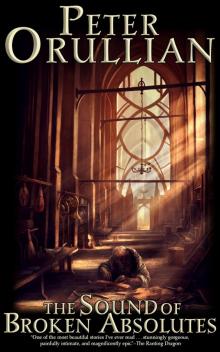 The Sound of Broken Absolutes
The Sound of Broken Absolutes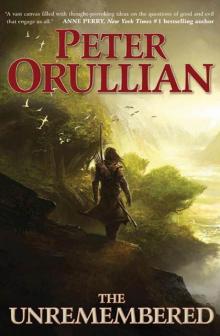 The Unremembered: Book One of The Vault of Heaven
The Unremembered: Book One of The Vault of Heaven The Hell of It
The Hell of It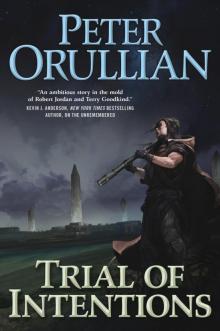 Trial of Intentions
Trial of Intentions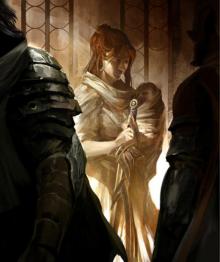 The Great Defense of Layosah
The Great Defense of Layosah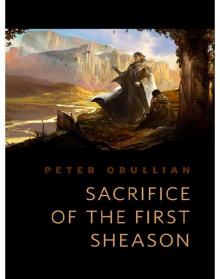 Sacrifice of the First Sheason
Sacrifice of the First Sheason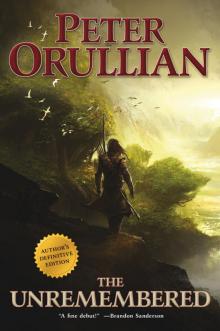 The Unremembered
The Unremembered